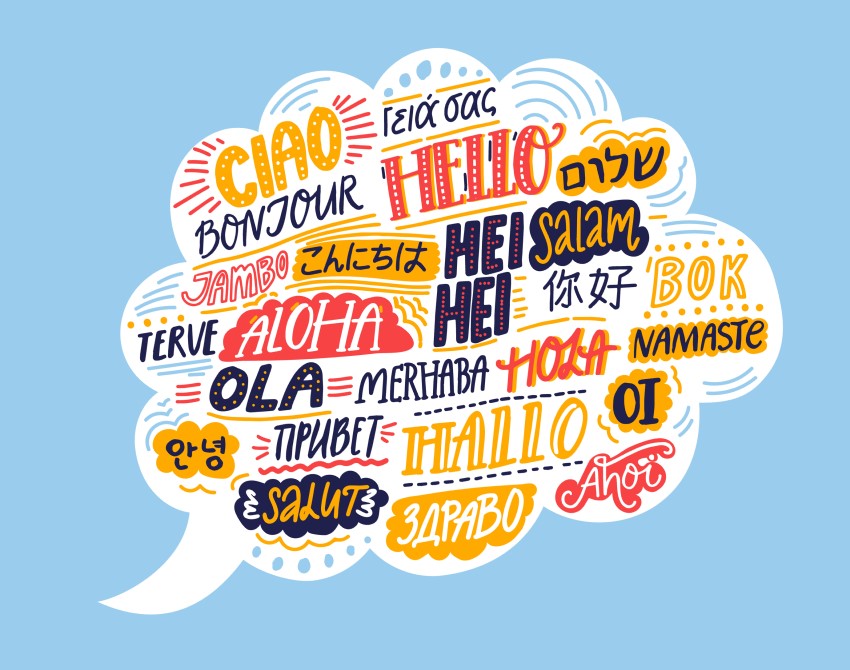In today’s globalized business world, multilingualism is becoming increasingly important for companies looking to succeed in international markets. Multilingualism is no longer just a competitive advantage, but a basic requirement for businesses that want to succeed on a global level.
In this blog post, we explore the many benefits of multilingualism in the workplace and how it can contribute to business success. Whether you’re a Gen Z employee starting out or an HR or L&D professional with many years of experience, this blog post is for you!

Multilingualism and improved communication in the workplace
Effective communication is crucial to the internal success and smooth running of any business. Multilingualism in the workplace promotes better (international) communication and makes it easier for employees from all over the world to work together and achieve common goals.

Read our eBook to find out more about how you can master the hybrid workday and achieve world-class business success.
Multilingualism and company growth
Multilingualism is also crucial for companies in terms of expansion and effective communication in today’s global economy: it helps them enter new markets and increase competitiveness and sales.
Multilingual employees can help the company reach a wider audience within the company and in society. In particular, a multilingual social media presence can build trust and credibility with an international audience.
Multilingualism, cultural competence, diversity and inclusion
Cultural competence is essential in a global business environment. Companies that understand the cultural differences between their partners and customers can build stronger relationships, avoid cultural misunderstandings and develop successful strategies for doing business in different regions. Multilingual employees help bridge cultural differences and facilitate communication between people from different cultures.
A multilingual approach in the company also promotes intercultural understanding among employees and helps to avoid intercultural misunderstandings in the company. Why? Because multilingualism is closely linked to cultural competence. Mastering a language means not only being able to communicate in that language but also understanding the culture behind it. According to a Forbes report, Bilingualism has been shown to improve cognitive skills, including the ability to understand and navigate other cultures, leading to closer relationships with international partners and customers.
In addition, multilingual employees can provide linguistic support to colleagues who are not fluent in the language of the workplace. This creates a more inclusive workplace and helps build a stronger team. Multilingual employees are therefore essential for today’s diverse workplaces and intercultural teams in a global business environment!

Learn more about diversity and inclusion in our white paper.
Multilingualism and talent development
Multilingualism is not only important for companies but also for the professional development of each employee. Multilingualism can improve non-linguistic tasks: A Harvard Business Review study found that multilingual people are better at multitasking and have greater cognitive flexibility, which can lead to more effective communication and decision-making in the workplace.
Language skills are increasingly seen as a key competitive advantage for global businesses: Companies often specifically look for employees who can communicate with customers and partners in different regions of the world. Multilingualism is even associated with better career opportunities, higher salaries, and greater job security.
How multilingualism affects business success
Here’s a summary of the 7 main benefits of multilingualism in business:
- Better career opportunities and higher salaries for employees: Multilingualism is associated with better career opportunities, higher salaries, and greater job security. In today’s global job market, speaking more than one language is an advantage.
- Cultural competence and adaptability: Multilingual workers are more likely to develop cultural competence and adaptability, which are essential in today’s diverse workplace. Multilingualism helps workers appreciate cultural differences and work effectively in cross-cultural teams.
- A more inclusive workplace and a stronger team: multilingual employees can provide language support to colleagues who are not fluent in the language of the workplace. This creates a more inclusive workplace and helps build a stronger team.
- Better business relationships: Multilingualism helps break down communication barriers and improve cross-cultural understanding, which in turn leads to better business relationships. A multilingual workforce can help companies expand their reach, enter new markets and increase sales.
- More exports and competitiveness: Companies that employ multilingual staff are more likely to export their products and services to other countries. The ability to speak the language of the target market increases the chances of building trust with potential customers and understanding their needs. In addition, multilingual employees can help companies adapt to local cultures, avoid cultural misunderstandings and build closer relationships with their partners and customers.
- Better customer service: Multilingual staff can help companies provide better customer service to customers speaking other languages. This can lead to higher customer satisfaction and retention.
- Social media presence: Multilingualism helps businesses reach a wider audience through social media. A multilingual presence on social media can help businesses build trust and credibility with international audiences.
Overall, multilingualism is critical to business success in today’s global economy. From better job opportunities and higher salaries to better business relationships and a more inclusive workplace, language skills give companies a competitive edge.
How to encourage multilingulism
We’ve learned: In today’s globalized world, effective communication in different languages is becoming increasingly important for businesses to expand and succeed in the global marketplace and for individuals to promote their own careers.
Learning a new language can be a challenging task, but with the right approach and tools, it can be an enjoyable and rewarding experience.
The key points are:
- Set clear goals: It is important to define your goals for language learning and what you want to achieve from it. Whether it’s for personal or professional development, setting clear goals will help you stay motivated and focused.
- Consistency is key: Learning a new language requires regular practice and commitment. Consistency is key to building and maintaining language skills. A few minutes of practice every day is more effective than long study sessions once a week.
- Immersion: Immerse yourself in the language by listening to music, watching films, reading books or speaking to native speakers. This will help you develop a better understanding of the culture and context of the language.
- Use digital learning tools: Digital language learning tools such as Speexx offer a flexible and effective way to learn a language. They offer various interactive and engaging activities that cater to different learning styles and allow you to practice and assess your language skills.
- Feedback and coaching: Getting feedback and coaching from a language expert or coach can help you identify areas for improvement and develop more advanced language skills. Digital language learning solutions such as Speexx offer personalized coaching and feedback to help you achieve your language learning goals.
By following these key points, companies and individuals can achieve their personal language goals and communicate effectively in the multilingual global marketplace.

It’s time to promote multilingualism
In today’s global economy, multilingualism is more important than ever. It’s time for companies to invest in language training for their employees, promote language exchange programs and create a multilingual culture within their organizations. And with the right approach and tools, language learning can be an enjoyable and rewarding experience that opens up new opportunities for personal and professional growth.

